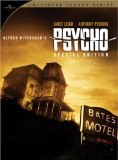| Reviews & Columns |
|
Reviews DVD TV on DVD Blu-ray 4K UHD International DVDs In Theaters Reviews by Studio Video Games Features Collector Series DVDs Easter Egg Database Interviews DVD Talk Radio Feature Articles Columns Anime Talk DVD Savant Horror DVDs The M.O.D. Squad Art House HD Talk Silent DVD
|
DVD Talk Forum |
|
|
| Resources |
|
DVD Price Search Customer Service #'s RCE Info Links |
|
Columns
|
|
|
Psycho
Universal // R // October 7, 2008
List Price: $26.98 [Buy now and save at Amazon]
**All screen comparisons used in this review, are first from the 1998 release, and then from the Legacy Series release**
Robert Bloch must be rolling over in his grave. You may not recognize the name, but he's the man that sold the film rights for Psycho to Alfred Hitchcock for a sum of just $9,000. It wasn't as if Hitchcock didn't have any financial troubles with Psycho though. He had to finance the film from his very own entity, Shamley Productions. Paramount wanted nothing to do with it. They thought it was too grotesque a story for an audience to handle. Yet here we are, forty eight years later, and Psycho is recognized as cinematic art, and has appeared on numerous top film lists, including many from the American Film Institute itself.
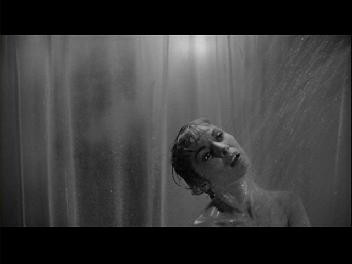
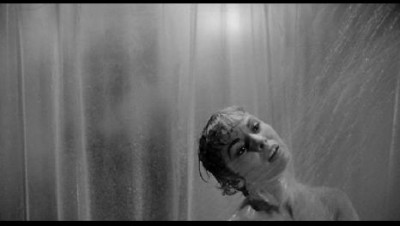
This movie helped pave the way for common practices in film as we know them today. Norman Bates was a gold mine for character study, and the infamous shower scene has become common curriculum for film classes around the world. Alfred Hitchcock is the master of mystery and suspense, but there's certainly no mystery as to why if you've seen this film.
Marion Crane (Janet Leigh) is a simple woman that has a fairly complicated problem. She's been seeing Sam Loomis (John Gavin), who lives in California, and they're both madly in love and wish to marry. However, he lives on very little money and wouldn't be able to support her. He's stuck in a rut of paying alimony to his ex-wife. On top of that, he also lives in California, which is a bit of a hike from where Marion lives. They continue to see each other when they can, but they want more. They're tired of feeling like they're sneaking around, and want to make it official.
After a rendezvous with Sam during her lunch break, she heads back to work. She's given $40,000 to deposit in the bank for her employer, and she decides to take the money and use it to start the new life with Sam they've always dreamed about.
On her way to California, she stops at the Bates Motel for some much needed rest, and is welcome by owner and caretaker, Norman Bates. He's a very nice man, but reveals to Marion his life as a prisoner. He's bound to that hotel, because he takes care of his sickly mother in the house on the hill out back. It used to bother him, but the very thought of leaving his controlling mother behind fills him with guilt. After Marion finishes her increasingly awkward conversation with Norman, she retires to her room for the evening... and that's the last time anybody sees her alive.
Over the next week, Marion's sister and Sam grow increasingly worried over her sudden disappearance. Their worry is only heightened when a detective that's on the hunt for the missing forty grand starts to confirm their suspicion that Marion's dead. All signs point back to the Bates Motel, but the case is far from being solved. Despite the obvious answer as to where Marion disappeared, how, and why, are the real reasons why you must see this film if you've never done so before.
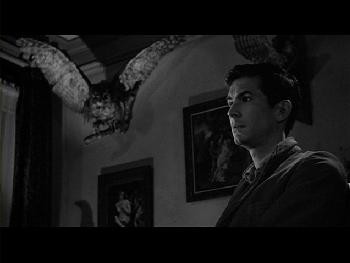
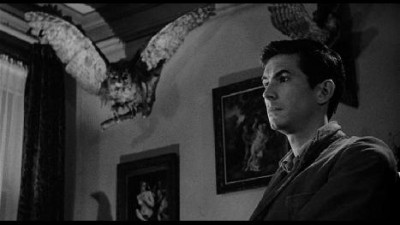
I can't say anything about Psycho that hasn't been said before. As I mentioned, it's common curriculum for film 101. So, I'm going to tell you why Psycho works so well for me, even after all the years worth of repeat viewing.
Alfred Hitchcock deceives the audience not just through mystery, but in the way the story is told. From the beginning of the film we follow the life of Marion Crane. She's set up to be the central character for the film. It's not as if she just rolls on screen and the infamous shower scene happens in the first ten minutes to set up the mystery. We get to know her, become comfortable with her, and then the shower scene happens and the game changes considerably. It's something you wouldn't expect, and I've never been able to shake the concept of how masterfully Hitchcock played this out.
Pyscho also manages to do something very few movies have ever done for me. The entirety of the film is laced with extremely intense discomfort. For one reason or another, there's always a sense of a cat and mouse game going on. Sure, the concept itself isn't revolutionary, but Hitchcock was able to work it effectively from beginning to end. Everything was crafted to create an atmosphere that kept you on the edge of your seat, from camera angles, lighting, the acting, pacing, as well as using some subliminal photography. There are numerous things Hitchcock had to fight about with the MPAA, so he relied heavily on making something as integral as the shower scene, trick you into seeing something you didn't really see. Incredible amounts of hard work and nit-picky oversight from Hitchcock made this film what it is, and it shows in every frame. I do mean every frame, too.
Some director's put every piece of their soul and being in a movie, and fail miserably. Some, work just as hard and get some very nice recognition for their work. Hitchcock's Psycho however, is an extremely rare case where its effectiveness still works just as good today, as it did back then. That's a quality that very few movies in cinematic history can boast about.
Video
I've seen the DVD that was released back in 1998, but I've never had the opportunity to see how this film looked as part of the Alfred Hitchcock - Masterpiece Collection boxed set. There's a gold sticker on the front of the book style Legacy Series case that says 'digitally remastered picture'.
This could be the same transfer that's presented in the Masterpiece Collection, but I certainly couldn't say for sure. Either way, this is the first time Psycho has been released on DVD by itself as a digitally remastered effort.
The original non-anamorphic release contained grain as it should. However, there was some grain that was added as noise from the transfer. It was a very minor amount, but you can see a difference with the new 1.85:1 anamorphic transfer. Some scenes look incredibly clean for a film that's almost half a century old, but there's still a very fine amount of grain present. Some shots have a lot of grain, but this is from the film itself, not a fault of the transfer.
Speaking of the film footage itself, it's worth noting that besides the grain, this is a very clean looking transfer. There's still dirt from the film that you'll see, but it's never distracting. The older release never had a big issue with film specks either, not to the point where it was distracting at least, but again, this was worth mentioning if you've never had the pleasure of seeing Psycho.
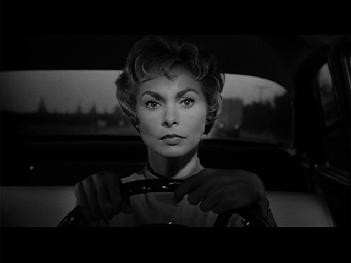
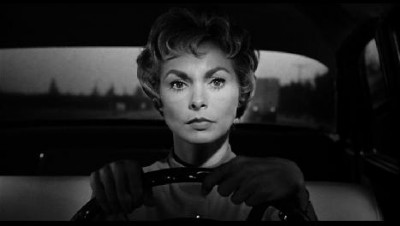
Most noticeably however is the increase in contrast in the latest release. As you can tell from the screens I took of Marion driving, the Legacy Series has better blacks, and increases the brightness in the lighter areas without causing any unnatural blooming. What we're left with, is the atmosphere that Hitchcock originally intended. Every shot with perfected with the angle Hitchcock wanted, as well as the lighting. Now that both light and dark areas have been tweaked to complement each other on DVD better than ever, the atmosphere is more effective than ever before.
The image is sharper overall as well. The older edition of the film seemed to have a slight haze to it, due to the lack of contrast and soft edges. The much improved contrast may not have worked so well if it wasn't for the sharpness being brought back up to par. Psycho relies on its imagery for maximum effect of the atmosphere it provides, and thankfully, we have a faithful recreation on this disc of what the film may have looked like in theaters many years ago. You can't ask for much more than to have the transfer truly look like it's actual film footage, and that's exactly the end product we have on this release.
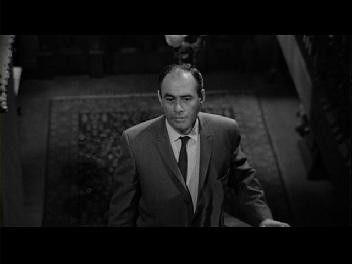
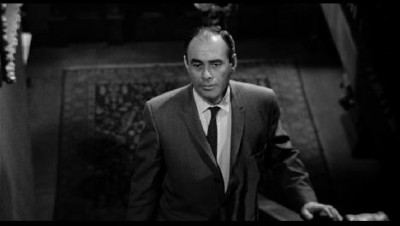
Audio
With how often Universal can get things wrong, at least they understand that the best movie experience comes from what the director originally intended. We're given a Dolby Digital 2.0 mono track that much like the video, is incredibly clean for its age. The score for the film is also an integral part in the film's atmosphere. When the music strikes, it's loud and unnerving. The music never seems to give way to any hissing or pops. The dialogue in this film also has no issues of the sort to mention either.
Of course, what you don't hear is just as important for the mood as well. There are moments of the film that are incredibly silent. With older films on DVD, you'd typically expect to hear a very faint white noise whispering. This is not the case with this DVD. Special care has been given to make sure the original experience has been brought forth in what's supposed to be the definitive Psycho release on DVD.
Also presented in Dolby Digital 2.0 mono is a French language track. Also available are subtitles in English SDH, Spanish, and French.
Extras
Disc 1
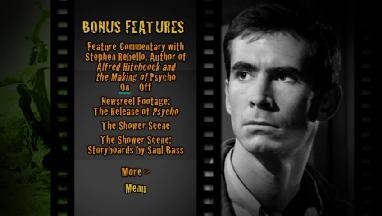
Commentary with Stephen Rebello, Author of Alfred Hitchcock and the Making of Psycho - Well, we can't have a commentary from Hitchcock himself, but we have a very nice commentary none-the-less. Stephen as an expert on the film, and his recording for this release is incredibly informative. He's able to point out all of the small nuances that made the film as effective as it is. Stephen is also able to give us a great amount of information about the financing of the film, and much of what went on behind the scenes with Hitchcock trying to bring his vision to life. He's also not a complete bore to listen to either. He knows his stuff inside and out, and he has a good time telling the details. From discussing the problems Hitchcock had with the censors, up to what we see in the final product, this track is about as informative as they come.
Newsreel Footage: The Release of Pyscho - This feature is close to eight minutes in length, and is a supplemental advertising feature that I imagine was released shortly after the film's theatrical release. Hitchcock and another commentator inform us of the unique rules that were applied for movie-goers that wanted to see this film. I'm sure we can all relate to how obnoxious it is when we go to the movies, only to have the beginning of the film interrupted by late comers. There wasn't that problem with Psycho, as you absolutely were not allowed in to the movie if arrived after it began. We're also told of pre-recorded audio messages Hitchcock would have blared to the movie-goers that were waiting in ticket lines, as well as a board that was updated minute by minute by hand to inform viewers how long it would be before the next showing began.
The Shower Scene - With and Without Music - Hitchcock originally wanted this scene to be in the film without any music, but of course, he changed his mind once he heard what effect the score had added. To show us Hitchcock's original intention compared with what we have in the final product, we get to see the infamous 'Shower Scene' in both forms. I was quite surprised to see how effective this scene was, even without the score.
The Shower Scene - Storyboards by Saul Bass - It's just as the description of the feature says. It's just a bunch of official storyboard drawings for the infamous 'Shower Scene'.
The Psycho Archives, Posters and Psycho ads, Lobby Cards, and Behind the Scenes Photographs, - These features are all slideshows of numerous promotional and behind the scenes stills that were used for the promotion of Psycho.
Production Notes - Is a text driven feature that details the production of the film. It's a rather dry way to bring across the information, as there's no audio or anything of the like. All you do is click an arrow and keep reading.
Also included on the first disc is the theatrical trailer, as well as the re-release trailers.
Disc 2
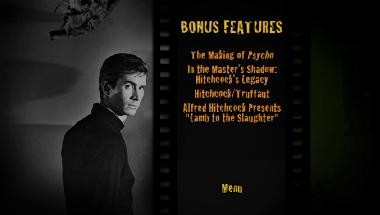
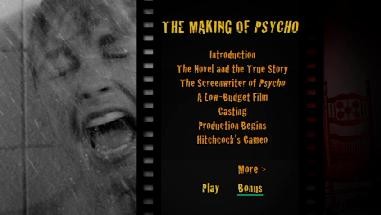
The 'Making Of Pyscho' featurette is accessed from the main menu, then you can select to watch any segment you choose.
The Making of Psycho - This feature is broken up into twenty six chapters, and is just over an hour and a half in length. Hitchcock introduces the feature, and the rest is taken over through a series of interviews from Hitchcock's wife, people who worked with him on the film, and more. There's much of the information presented here that you may have already heard in the commentary from Psycho expert Stephen Rebello. However, this is still more than worth the watch. You can't get any better a source of information, than people who were close to Hitchcock during his life, and during the production of this film.
In the Master's Shadow - Hitchcock's Legacy - This feature is a half an hour in length, and brings together many of the behind the scenes talent in Hollywood. A lot of what is discussed focuses on how Hitchcock's films influenced the works of others in the business, including Eli Roth, Guillermo Del Toro, and sound editors, writers, and more.
Hitchcock Truffaut - These are audio recordings of a Hitchcock interview that discussed his book that was simply title, Hitchcock. Pieces of score from the film are used with a montage of clips from the film, so listening to the interview isn't as dull as staring at a screen that never moves for fifteen minutes.
Alfred Hitchcock Presents "Lamb to the Slaughter" - This is a full length episode from Alfred Hitchcock Presents.
Everything you could possibly want to know about this film is contained on these two discs. It's hard for me to imagine anyone could hear the provided commentary, and see the incredible amount of features that give us a wealth of information, and not walk away satisfied.
The subtitles listed in the audio section are available for these features as well.
Overall
Psycho is a masterful creation of atmosphere and suspense. This is a film that plays some very dirty tricks on the audience to continually make you sit on the edge of your seat, even after numerous repeat viewings. It's hard to imagine anyone who claims to be a film lover, not appreciating one of the most influential films of all time. Hitchcock was a perfectionist every step of the way whenever it came to any of his masterpieces, and Psycho is a film that looks as close to perfection as anything I've ever seen. I dare you to find a single frame in the film where the cinematography doesn't show the amount of effort that went in camera angling or lighting to provide a feature length amount of chills.
I've done dozens of reviews for this site, and I've never done this before. I'm proud to say that the Psycho - Legacy Series release is the first title I'm awarding the DVD Talk Collector Series rating to. This movie is one that no fan of film should ever be without. It's a crime not to have this movie in your collection. With pristine video and audio, as well as a horde of extras that are as informative as they can be without raising Hitchcock himself from the grave, Universal has knocked the ball out of the park with this release.
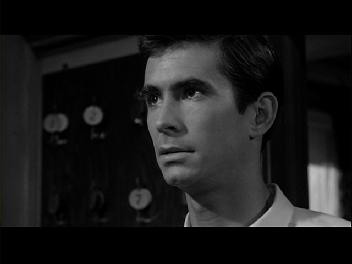
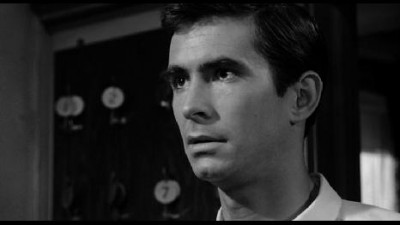
Robert Bloch must be rolling over in his grave. You may not recognize the name, but he's the man that sold the film rights for Psycho to Alfred Hitchcock for a sum of just $9,000. It wasn't as if Hitchcock didn't have any financial troubles with Psycho though. He had to finance the film from his very own entity, Shamley Productions. Paramount wanted nothing to do with it. They thought it was too grotesque a story for an audience to handle. Yet here we are, forty eight years later, and Psycho is recognized as cinematic art, and has appeared on numerous top film lists, including many from the American Film Institute itself.


This movie helped pave the way for common practices in film as we know them today. Norman Bates was a gold mine for character study, and the infamous shower scene has become common curriculum for film classes around the world. Alfred Hitchcock is the master of mystery and suspense, but there's certainly no mystery as to why if you've seen this film.
Marion Crane (Janet Leigh) is a simple woman that has a fairly complicated problem. She's been seeing Sam Loomis (John Gavin), who lives in California, and they're both madly in love and wish to marry. However, he lives on very little money and wouldn't be able to support her. He's stuck in a rut of paying alimony to his ex-wife. On top of that, he also lives in California, which is a bit of a hike from where Marion lives. They continue to see each other when they can, but they want more. They're tired of feeling like they're sneaking around, and want to make it official.
After a rendezvous with Sam during her lunch break, she heads back to work. She's given $40,000 to deposit in the bank for her employer, and she decides to take the money and use it to start the new life with Sam they've always dreamed about.
On her way to California, she stops at the Bates Motel for some much needed rest, and is welcome by owner and caretaker, Norman Bates. He's a very nice man, but reveals to Marion his life as a prisoner. He's bound to that hotel, because he takes care of his sickly mother in the house on the hill out back. It used to bother him, but the very thought of leaving his controlling mother behind fills him with guilt. After Marion finishes her increasingly awkward conversation with Norman, she retires to her room for the evening... and that's the last time anybody sees her alive.
Over the next week, Marion's sister and Sam grow increasingly worried over her sudden disappearance. Their worry is only heightened when a detective that's on the hunt for the missing forty grand starts to confirm their suspicion that Marion's dead. All signs point back to the Bates Motel, but the case is far from being solved. Despite the obvious answer as to where Marion disappeared, how, and why, are the real reasons why you must see this film if you've never done so before.


I can't say anything about Psycho that hasn't been said before. As I mentioned, it's common curriculum for film 101. So, I'm going to tell you why Psycho works so well for me, even after all the years worth of repeat viewing.
Alfred Hitchcock deceives the audience not just through mystery, but in the way the story is told. From the beginning of the film we follow the life of Marion Crane. She's set up to be the central character for the film. It's not as if she just rolls on screen and the infamous shower scene happens in the first ten minutes to set up the mystery. We get to know her, become comfortable with her, and then the shower scene happens and the game changes considerably. It's something you wouldn't expect, and I've never been able to shake the concept of how masterfully Hitchcock played this out.
Pyscho also manages to do something very few movies have ever done for me. The entirety of the film is laced with extremely intense discomfort. For one reason or another, there's always a sense of a cat and mouse game going on. Sure, the concept itself isn't revolutionary, but Hitchcock was able to work it effectively from beginning to end. Everything was crafted to create an atmosphere that kept you on the edge of your seat, from camera angles, lighting, the acting, pacing, as well as using some subliminal photography. There are numerous things Hitchcock had to fight about with the MPAA, so he relied heavily on making something as integral as the shower scene, trick you into seeing something you didn't really see. Incredible amounts of hard work and nit-picky oversight from Hitchcock made this film what it is, and it shows in every frame. I do mean every frame, too.
Some director's put every piece of their soul and being in a movie, and fail miserably. Some, work just as hard and get some very nice recognition for their work. Hitchcock's Psycho however, is an extremely rare case where its effectiveness still works just as good today, as it did back then. That's a quality that very few movies in cinematic history can boast about.
I've seen the DVD that was released back in 1998, but I've never had the opportunity to see how this film looked as part of the Alfred Hitchcock - Masterpiece Collection boxed set. There's a gold sticker on the front of the book style Legacy Series case that says 'digitally remastered picture'.
This could be the same transfer that's presented in the Masterpiece Collection, but I certainly couldn't say for sure. Either way, this is the first time Psycho has been released on DVD by itself as a digitally remastered effort.
The original non-anamorphic release contained grain as it should. However, there was some grain that was added as noise from the transfer. It was a very minor amount, but you can see a difference with the new 1.85:1 anamorphic transfer. Some scenes look incredibly clean for a film that's almost half a century old, but there's still a very fine amount of grain present. Some shots have a lot of grain, but this is from the film itself, not a fault of the transfer.
Speaking of the film footage itself, it's worth noting that besides the grain, this is a very clean looking transfer. There's still dirt from the film that you'll see, but it's never distracting. The older release never had a big issue with film specks either, not to the point where it was distracting at least, but again, this was worth mentioning if you've never had the pleasure of seeing Psycho.


Most noticeably however is the increase in contrast in the latest release. As you can tell from the screens I took of Marion driving, the Legacy Series has better blacks, and increases the brightness in the lighter areas without causing any unnatural blooming. What we're left with, is the atmosphere that Hitchcock originally intended. Every shot with perfected with the angle Hitchcock wanted, as well as the lighting. Now that both light and dark areas have been tweaked to complement each other on DVD better than ever, the atmosphere is more effective than ever before.
The image is sharper overall as well. The older edition of the film seemed to have a slight haze to it, due to the lack of contrast and soft edges. The much improved contrast may not have worked so well if it wasn't for the sharpness being brought back up to par. Psycho relies on its imagery for maximum effect of the atmosphere it provides, and thankfully, we have a faithful recreation on this disc of what the film may have looked like in theaters many years ago. You can't ask for much more than to have the transfer truly look like it's actual film footage, and that's exactly the end product we have on this release.


With how often Universal can get things wrong, at least they understand that the best movie experience comes from what the director originally intended. We're given a Dolby Digital 2.0 mono track that much like the video, is incredibly clean for its age. The score for the film is also an integral part in the film's atmosphere. When the music strikes, it's loud and unnerving. The music never seems to give way to any hissing or pops. The dialogue in this film also has no issues of the sort to mention either.
Of course, what you don't hear is just as important for the mood as well. There are moments of the film that are incredibly silent. With older films on DVD, you'd typically expect to hear a very faint white noise whispering. This is not the case with this DVD. Special care has been given to make sure the original experience has been brought forth in what's supposed to be the definitive Psycho release on DVD.
Also presented in Dolby Digital 2.0 mono is a French language track. Also available are subtitles in English SDH, Spanish, and French.

Commentary with Stephen Rebello, Author of Alfred Hitchcock and the Making of Psycho - Well, we can't have a commentary from Hitchcock himself, but we have a very nice commentary none-the-less. Stephen as an expert on the film, and his recording for this release is incredibly informative. He's able to point out all of the small nuances that made the film as effective as it is. Stephen is also able to give us a great amount of information about the financing of the film, and much of what went on behind the scenes with Hitchcock trying to bring his vision to life. He's also not a complete bore to listen to either. He knows his stuff inside and out, and he has a good time telling the details. From discussing the problems Hitchcock had with the censors, up to what we see in the final product, this track is about as informative as they come.
Newsreel Footage: The Release of Pyscho - This feature is close to eight minutes in length, and is a supplemental advertising feature that I imagine was released shortly after the film's theatrical release. Hitchcock and another commentator inform us of the unique rules that were applied for movie-goers that wanted to see this film. I'm sure we can all relate to how obnoxious it is when we go to the movies, only to have the beginning of the film interrupted by late comers. There wasn't that problem with Psycho, as you absolutely were not allowed in to the movie if arrived after it began. We're also told of pre-recorded audio messages Hitchcock would have blared to the movie-goers that were waiting in ticket lines, as well as a board that was updated minute by minute by hand to inform viewers how long it would be before the next showing began.
The Shower Scene - With and Without Music - Hitchcock originally wanted this scene to be in the film without any music, but of course, he changed his mind once he heard what effect the score had added. To show us Hitchcock's original intention compared with what we have in the final product, we get to see the infamous 'Shower Scene' in both forms. I was quite surprised to see how effective this scene was, even without the score.
The Shower Scene - Storyboards by Saul Bass - It's just as the description of the feature says. It's just a bunch of official storyboard drawings for the infamous 'Shower Scene'.
The Psycho Archives, Posters and Psycho ads, Lobby Cards, and Behind the Scenes Photographs, - These features are all slideshows of numerous promotional and behind the scenes stills that were used for the promotion of Psycho.
Production Notes - Is a text driven feature that details the production of the film. It's a rather dry way to bring across the information, as there's no audio or anything of the like. All you do is click an arrow and keep reading.
Also included on the first disc is the theatrical trailer, as well as the re-release trailers.


The Making of Psycho - This feature is broken up into twenty six chapters, and is just over an hour and a half in length. Hitchcock introduces the feature, and the rest is taken over through a series of interviews from Hitchcock's wife, people who worked with him on the film, and more. There's much of the information presented here that you may have already heard in the commentary from Psycho expert Stephen Rebello. However, this is still more than worth the watch. You can't get any better a source of information, than people who were close to Hitchcock during his life, and during the production of this film.
In the Master's Shadow - Hitchcock's Legacy - This feature is a half an hour in length, and brings together many of the behind the scenes talent in Hollywood. A lot of what is discussed focuses on how Hitchcock's films influenced the works of others in the business, including Eli Roth, Guillermo Del Toro, and sound editors, writers, and more.
Hitchcock Truffaut - These are audio recordings of a Hitchcock interview that discussed his book that was simply title, Hitchcock. Pieces of score from the film are used with a montage of clips from the film, so listening to the interview isn't as dull as staring at a screen that never moves for fifteen minutes.
Alfred Hitchcock Presents "Lamb to the Slaughter" - This is a full length episode from Alfred Hitchcock Presents.
Everything you could possibly want to know about this film is contained on these two discs. It's hard for me to imagine anyone could hear the provided commentary, and see the incredible amount of features that give us a wealth of information, and not walk away satisfied.
The subtitles listed in the audio section are available for these features as well.
Psycho is a masterful creation of atmosphere and suspense. This is a film that plays some very dirty tricks on the audience to continually make you sit on the edge of your seat, even after numerous repeat viewings. It's hard to imagine anyone who claims to be a film lover, not appreciating one of the most influential films of all time. Hitchcock was a perfectionist every step of the way whenever it came to any of his masterpieces, and Psycho is a film that looks as close to perfection as anything I've ever seen. I dare you to find a single frame in the film where the cinematography doesn't show the amount of effort that went in camera angling or lighting to provide a feature length amount of chills.
I've done dozens of reviews for this site, and I've never done this before. I'm proud to say that the Psycho - Legacy Series release is the first title I'm awarding the DVD Talk Collector Series rating to. This movie is one that no fan of film should ever be without. It's a crime not to have this movie in your collection. With pristine video and audio, as well as a horde of extras that are as informative as they can be without raising Hitchcock himself from the grave, Universal has knocked the ball out of the park with this release.


-About the Author- Michael Zupan is primarily a film guy, but has a variety of places where you can enjoy his work otherwise. Check Bytesizeimpressions.com for video game op-ed pieces and podcasts, and be sure to check out the sister site, Byte-Size Cinema, linked up top. This writer also contributes significantly to in-print magazines such as Minecraft Explorer and Fortnite Explorer!
|
| Popular Reviews |
| Sponsored Links |
|
|
| Sponsored Links |
|
|
| Release List | Reviews | Shop | Newsletter | Forum | DVD Giveaways | Blu-Ray | Advertise |
|
Copyright 2024 DVDTalk.com All Rights Reserved. Legal Info, Privacy Policy, Terms of Use,
Manage Preferences,
Your Privacy Choices | |||||||









